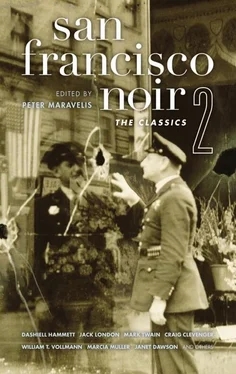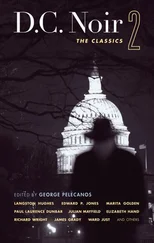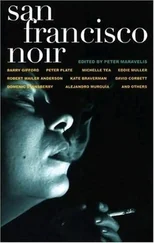Ambrose Bierce - San Francisco Noir 2 - The Classics
Здесь есть возможность читать онлайн «Ambrose Bierce - San Francisco Noir 2 - The Classics» весь текст электронной книги совершенно бесплатно (целиком полную версию без сокращений). В некоторых случаях можно слушать аудио, скачать через торрент в формате fb2 и присутствует краткое содержание. Город: New York, Год выпуска: 2009, ISBN: 2009, Издательство: Akashic Books, Жанр: Детектив, на английском языке. Описание произведения, (предисловие) а так же отзывы посетителей доступны на портале библиотеки ЛибКат.
- Название:San Francisco Noir 2: The Classics
- Автор:
- Издательство:Akashic Books
- Жанр:
- Год:2009
- Город:New York
- ISBN:978-1-933354-65-1
- Рейтинг книги:5 / 5. Голосов: 1
-
Избранное:Добавить в избранное
- Отзывы:
-
Ваша оценка:
- 100
- 1
- 2
- 3
- 4
- 5
San Francisco Noir 2: The Classics: краткое содержание, описание и аннотация
Предлагаем к чтению аннотацию, описание, краткое содержание или предисловие (зависит от того, что написал сам автор книги «San Francisco Noir 2: The Classics»). Если вы не нашли необходимую информацию о книге — напишите в комментариях, мы постараемся отыскать её.
, which captures the dark mythology of a world-class locale.
San Francisco Noir 2: The Classics — читать онлайн бесплатно полную книгу (весь текст) целиком
Ниже представлен текст книги, разбитый по страницам. Система сохранения места последней прочитанной страницы, позволяет с удобством читать онлайн бесплатно книгу «San Francisco Noir 2: The Classics», без необходимости каждый раз заново искать на чём Вы остановились. Поставьте закладку, и сможете в любой момент перейти на страницу, на которой закончили чтение.
Интервал:
Закладка:
Then Mom met Hank’s dad and got some of the sparkle back in her eyes. Of course, Grandma kicked them out because Mom took up with Hank’s dad. He was a different color than Mom, and Grandma said bad things about him, but Greta liked him a lot. He drove a cab and brought her chocolate, her favorite. And when Hank was born, a year or so later, she thought the baby was beautiful. She loved him and swore she’d always take care of him, no matter what. She just didn’t think it would be this soon.
Hank didn’t remember his dad much. He was not quite three when the cabdriver was shot to death. Greta heard one of the other cabbies at the funeral say Hank’s dad should have given the money to the punk who pulled a gun on him late one night. But Greta figured maybe the punk would have shot him anyway.
Hank’s dad had left something called life insurance, which was kind of strange to Greta, seeing he was dead. She’d have rather had Hank’s dad instead of money. It hadn’t been much anyway, and after a while there wasn’t any left.
She was nine and in the fourth grade when Hank’s dad got killed. She liked school, but the rest of her life was hard. She had to take care of Hank and Mom both. Hank because he was just a toddler, and Mom because she was drinking cheap, sweet-smelling wine in big bottles. Greta would come home from school and find her passed out on the bed of the tiny apartment, Hank roaming around on the floor with soiled pants.
Greta stayed home from school more often, missing classes. No one ever seemed to notice she was gone. Mom got fired from her job at the store and didn’t bother to get another job. She said she’d rather die than go back to live with Grandma, but as it turned out, Grandma had died by then and left all her money to some cousin.
They were evicted from that apartment. They moved to a run-down rickety hotel in the Tenderloin, where all three of them shared one room and a bath. Greta stopped going to school altogether, because looking after Mom and Hank was a full-time job. She’d cook their meager meals on a hot plate, put Mom to bed when she drank too much, and read to Hank so he could at least learn his letters. Then she’d put Hank to bed and try to get some sleep herself, which was hard to do. Down on the street, music spilled from the bars, and the hookers called to men cruising by in cars. The hookers worked for a tall man called a pimp, who hung out on the corner and kept an eye on the girls. Sometimes he hit them, and Greta would hear screams and shouts. She’d cover her ears with her hands, trying to keep the sounds out.
Then Mom started bringing men home, men who gave her money. Did that make her a hooker, too? Greta didn’t like to think about that. All she knew was that Mom would shut Hank and Greta out of the ugly room. They’d huddle together on the stairs that stank of urine, dodging the other residents of the hotel, those scary-looking weirdos Mom had warned Greta about in those few times when she wasn’t giggly and woozy from that stuff she was drinking.
One day Mom left. She said she was going to the store on the corner to get a bottle. But she never came back.
The manager of the hotel told Greta he was going to call social something to come and get the two children. But social something sounded like cops to Greta. She didn’t want to go to jail or wherever the cops would take them. She packed what little they had in the nylon bag and they left. Now they lived on the streets and it was getting harder to find food and stay warm.
Hank, his stomach filled by the pepperoni pizza and the cookies Greta had stolen from the bakery, drowsed next to her, leaning on her shoulder. Greta put one arm around him as she savored the last bite of her chocolate chip cookie. Then she felt someone’s eyes on her and looked quickly around, her senses honed by weeks of surviving on the urban landscape.
There he was, a man, staring at them across Union Square. She’d seen the man before, staring at them like this. He wore shapeless green coveralls, and stood hunched over the handle of a metal shopping cart. Inside the cart was a black plastic bag that clinked and clattered. Greta knew it was full of cans and bottles. The man had a black beard and a brown knit cap that didn’t quite disguise his long black hair.
Greta didn’t like the way he was always watching them. Then the man pushed his shopping cart toward them, the wheels squeaking. She jumped to her feet and shook Hank awake.
“Invisible time,” she whispered.
That meant it was time for them to disappear into the shadows. She picked up the nylon bag and slung it over her shoulder, then took Hank’s hand. The two children darted down the steps that led out of the square, across Geary Street, just as the green “walk” signal changed to a flashing amber “don’t walk.” As they angled to the left, Greta glanced back. The man in coveralls was following them, pushing his shopping cart into the crosswalk, ambling slowly as though he didn’t care that the light had changed to red and the people in the going-home cars were honking at him.
Greta tugged Hank’s arm and the two children rushed along Geary, dodging pedestrians. They turned right on Stockton, heading toward Market. Finally they pushed through a pair of big glass double doors and entered the first floor of the Virgin Megastore, sound pulsating around them.
They were in familiar territory now. The store was one of their favorite hangouts. It was brightly lit and full of loud music, where customers bought CDs, tapes, videos, and books. It was open late, and the children frequently spent the evening here, walking the aisles, riding the escalator up and down, and using the restroom on the third floor. Greta figured they’d lost the man with the shopping cart, but even if they hadn’t, he wouldn’t be able to follow them in here.
“I’m sleepy,” Hank told her on their fourth trip up the escalator. “Can we find a place to spend the night soon?”
Greta was tired, too, but she didn’t like to admit it. Watching and moving all the time took its toll, but she was afraid to let her guard down. She wished they could find a spot somewhere in this bright, warm store, but she knew that was a bad idea.
“Let’s go to the bathroom first,” she said. “Then we’ll find a place.”
They detoured to the third floor, past the videos and into the bookstore. The restrooms were located down a short hallway near the store’s café. Greta watched Hank dart into the men’s room, then pushed open the door marked with a woman’s silhouette. Sometimes, if they didn’t know the place, she’d take him with her into the women’s side, where they’d barricade themselves into the larger stall usually reserved for handicapped people. But they’d been here before and hadn’t had any problems. Greta felt as safe here as she felt anywhere, which wasn’t saying much.
When she came out of the restroom Hank was waiting for her, bouncing in time to the music that blared from the overhead speakers. Greta shifted the nylon bag from one shoulder to the other and they walked toward the café.
“You kids okay?”
The speaker was a young woman, wearing thick, clunky shoes and black tights under a short black skirt. Above that she wore a tight black T-shirt with the store’s name printed across her tiny round breasts. Her hair was cut short and dyed an odd bright pink. She had little gold rings arrayed up and down both ears, and a glittery jewel in her nose. Greta had seen her before, once working behind a cash register on the second floor and another time waiting tables in the store’s café.
Hank stared at her, transfixed. Greta started looking around for the quickest and shortest way out.
“I’ve seen you before,” the young woman said, talking quietly as though she were afraid they would bolt. “You come in and wander around for hours. Don’t you have any place to stay?” When neither of the children answered, she continued, her voice low and seductive. “I’ll bet you’re hungry. Would you like something to eat? Come back to the café. I’ll give you some gingerbread.”
Читать дальшеИнтервал:
Закладка:
Похожие книги на «San Francisco Noir 2: The Classics»
Представляем Вашему вниманию похожие книги на «San Francisco Noir 2: The Classics» списком для выбора. Мы отобрали схожую по названию и смыслу литературу в надежде предоставить читателям больше вариантов отыскать новые, интересные, ещё непрочитанные произведения.
Обсуждение, отзывы о книге «San Francisco Noir 2: The Classics» и просто собственные мнения читателей. Оставьте ваши комментарии, напишите, что Вы думаете о произведении, его смысле или главных героях. Укажите что конкретно понравилось, а что нет, и почему Вы так считаете.








